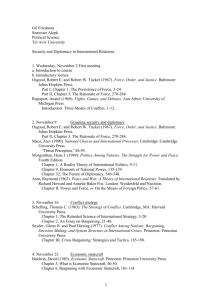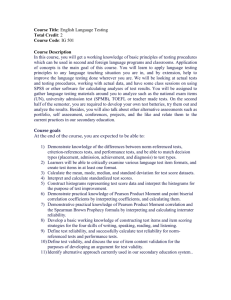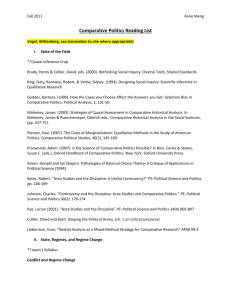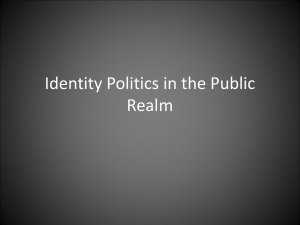Comparative Politics and Human Security
advertisement
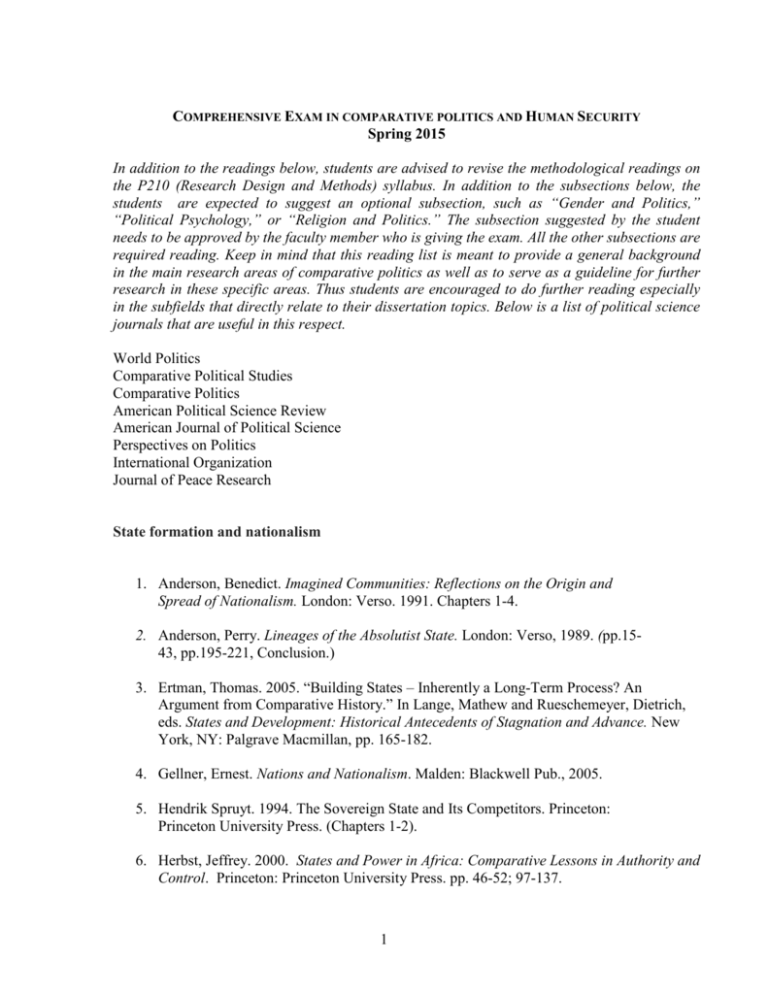
COMPREHENSIVE EXAM IN COMPARATIVE POLITICS AND HUMAN SECURITY Spring 2015 In addition to the readings below, students are advised to revise the methodological readings on the P210 (Research Design and Methods) syllabus. In addition to the subsections below, the students are expected to suggest an optional subsection, such as “Gender and Politics,” “Political Psychology,” or “Religion and Politics.” The subsection suggested by the student needs to be approved by the faculty member who is giving the exam. All the other subsections are required reading. Keep in mind that this reading list is meant to provide a general background in the main research areas of comparative politics as well as to serve as a guideline for further research in these specific areas. Thus students are encouraged to do further reading especially in the subfields that directly relate to their dissertation topics. Below is a list of political science journals that are useful in this respect. World Politics Comparative Political Studies Comparative Politics American Political Science Review American Journal of Political Science Perspectives on Politics International Organization Journal of Peace Research State formation and nationalism 1. Anderson, Benedict. Imagined Communities: Reflections on the Origin and Spread of Nationalism. London: Verso. 1991. Chapters 1-4. 2. Anderson, Perry. Lineages of the Absolutist State. London: Verso, 1989. (pp.1543, pp.195-221, Conclusion.) 3. Ertman, Thomas. 2005. “Building States – Inherently a Long-Term Process? An Argument from Comparative History.” In Lange, Mathew and Rueschemeyer, Dietrich, eds. States and Development: Historical Antecedents of Stagnation and Advance. New York, NY: Palgrave Macmillan, pp. 165-182. 4. Gellner, Ernest. Nations and Nationalism. Malden: Blackwell Pub., 2005. 5. Hendrik Spruyt. 1994. The Sovereign State and Its Competitors. Princeton: Princeton University Press. (Chapters 1-2). 6. Herbst, Jeffrey. 2000. States and Power in Africa: Comparative Lessons in Authority and Control. Princeton: Princeton University Press. pp. 46-52; 97-137. 1 7. Jackson, R. and C. Rosberg. 1982. “Why Africa's Weak States Persist.” In World Politics. 1-24. 8. Michael Hechter, Containing Nationalism (Oxford University Press, 2001), Chapters 1-4. 9. Laitin, David, Identity in Formation : the Russian-Speaking Populations in the Near Abroad. Ithaca: Cornell University Press, 1998. Pp.85-158. 10. Mamdani, Mahmood. 1996. Citizen and Subject – Contemporary Africa and the Legacy of Late Colonialism. Princeton: Princeton University Press, pp. 37-61. 11. Migdal, Joel S. 1988. Strong States and Weak Societies: State-Society Relations and State Capabilities in the Third World. Princeton: Princeton University Press. 12. William H. McNeil. 1982. The Pursuit of Power. Chicago: The University of Chicago Press. Chapters 1 and 3. 13. Douglas North. 1981. Structure and Change in Economic History. New York: Norton. Chapters 1-6. (skim: Chapters 11, 12, 13) 14. Mancur Olson. 2000. Power and Prosperity. New York: Basic Books. Chapters 1 and 2. 15. Pierson, Paul. 2003. “Big, Slow-Moving, and…Invisible: Macrosocial Processes in the Study of Comparative Politics.” In James Mahoney and Dietrich Rueschemeyer, eds. Comparative Historical Analysis in the Social Sciences. Cambridge: Cambridge University Press, pp. 177-207. 16. Rueschemeyer, Dietrich. 2005. “Building States – Inherently a Long-Term Process? An Argument from Theory.” In Lange, Mathew and Rueschemeyer, Dietrich, eds. States and Development: Historical Antecedents of Stagnation and Advance. New York, NY: Palgrave Macmillan, pp. 143-164. 17. David Stasavage. When Distance Mattered: Geographic Scale and the Development of European Representative Assemblies" American Political Science Review, 2010. 18. David Stasavage and Kenneth Scheve. Democracy, War, and Wealth: Evidence of Two Centuries of Inheritance Taxation. American Political Science Review, 2012. 19. Thelen, Kathleen. 2003. “How Institutions Evolve: Insights from Comparative Historical Analysis.” In James Mahoney and Dietrich Rueschemeyer, eds. Comparative Historical Analysis in the Social Sciences. Cambridge: Cambridge University Press, pp. 208-240. 20. Charles Tilly, Coercion, capital, and European states (Cambridge, MA: Basil Blackwell, 1992), 67-127. 2 21. Weber, Eugen. 1977. Peasants into Frenchmen. The Modernization of Rural France, 1870-1914. Stanford University Press (Chapters 4,6,7). 22. Wimmer, Andreas. 2012. Waves of War: Nationalism, State Formation, and Ethnic Exclusion in the Modern World (Cambridge Studies in Comparative Politics). (Introduction) 23. Young, Crawford. 1998. “Country Report: The African Colonial State Revisited” Governance: An International Journal of Policy and Administration 11, No. 1: 101-120. 24. Daniel Ziblatt. 2006. Structuring the State: The Formation of Italy and Germany and the Puzzle of Federalism. Princeton University Press. Chapters 1, 2, 5, 6. Political Institutions Regime Type and Regime Change 25. Acemoglu, Daron and James Robinson. 2006. Economic Origins of Democracy. Cambridge University Press. 26. Boix, Carles, and Susan Stokes. 2003. “Endogenous Democratization.” World Politics 55 (July): 517-549. 27. Boix, Carles. 2003. Democracy and Redistribution. Cambridge University Press. Chapters 1-3. 28. Collier, Ruth. Paths Toward Democracy: The Working Class and Elites in Western Europe and South America. Cambridge: Cambridge Studies in Comparative Politics, 1999. 29. Geddes, Barbara. 1999. “What Do We Know About Democratization after Twenty Years?” Annual Review of Political Science 2: 115-144. 30. Kuran, Timur. 1991. “Now Out of Never: The Element of Surprise in the East European Revolution of 1989 (in Liberalization and Democratization in the Soviet Union and Eastern Europe),” World Politics 44 (October): 7-48. 31. Lipset, Seymour Martin. “Some Social Requisites of Democracy: Economic Development and Political Legitimacy,” American Political Science Review, 53:1(March 1959) 69-105. 3 32. Luebbert, Gregory M. 1991. Liberalism, Fascism, or Social Democracy: Social Classes and the Political Origins of Regimes in Interwar Europe. New York : Oxford University Press. (skim). 33. Moore, Barrington. 1966. The Social Origins of Dictatorship and Democracy. Boston: Beacon Press. (Scan for core argument – Preface, pp. xi-ix; and Chapters VII-IX, pp. 413-482). 34. Phillips, Anne. 1991. Engendering Democracy. Polity Press. 35. Przeworski, Adam. Democracy and the Market: Political and Economic Reforms in Eastern Europe and Latin America. 1991. Chapters 1, 2 and 4. 36. Przeworski, Adam and Fernando Limongi. 1997. “Modernization: Theories and Facts,” World Politics 49 (January):155-183. 37. Theda Skocpol, States and Social Revolution. Cambridge University Press, 1979, pp. 342, 161-171. 38. Svolik, Milan. "Power-sharing and Leadership Dynamics in Authoritarian Regimes." American Journal of Political Science 53.2 (2009): 477-494. 39. Lisa Wedeen. 1999. Ambiguities of Domination : Politics, Rhetoric, and Symbols In Contemporary Syria. University of Chicago Press. 40. Ronald Wintrobe. 1990. “The Tinpot and the Totalitarian: An Economic Theory of Dictatorship,” American Political Science Review 84 (September): 849-872. 41. Dan Slater, Benjamin Smith and Gautam Nair, “Economic Origins of Democratic Breakdown? The Redistributive Model and the Postcolonial State.” Perspectives on Politics / Volume 12 / Issue 02 / June 2014, pp 353 – 374. 42. Barbara Geddes, Joseph Wright and Erica Frantz, “Autocratic Breakdown and Regime Transitions: A New Data Set” Perspectives on Politics / Volume 12 / Issue 02 / June 2014, pp 353 – 374. 4 Political parties, electoral systems, voting 43. Carles Boix,” The Emergence of Parties and Party Systems,” in Oxford Handbook of Comparative Politics, eds. Carles Boix and Susan Stokes (Oxford University Press, 2007). 44. Chandra, Kanchan. Why Ethnic Parties Succeed: Patronage and Ethnic Head Counts in India. (Cambridge University Press, 2004), 1-33. 45. Gary Cox. 1997. Making Votes Count. New York: Cambridge University Press, Chapters 1-3. 46. Downs, Anthony (1957). An Economic Theory of Democracy. Chapters 1-3; 7-8. 47. Mala Htun. “Is Gender Like Ethnicity? The Political Representation of Identity Groups.” Perspectives on Politics 2, 2004. 48. Stathis N Kalyvas, The Rise of Christian Democracy in Europe. (Cornell University Press, 1996). 49. Lipset, Seymour Martin and Stein Rokkan, “Cleavage Structures, Party Systems, and Voter Alignments”, in Mair, Peter. 1990. The West European party system. Oxford [England] ; New York: Oxford University Press, Chapter 9: p.91-138. 50. Posner, Daniel. Institutions and Ethnic Politics in Africa. (Cambridge University Press, 2005) pp. 130-149, 159-216. 51. Adam Przeworski and John Sprague. 1986. Paper Stones. A History of Electoral Socialism. Chicago: The University of Chicago Press. 29-126. 52. Susan Stokes, “Political Clientelism,” in Oxford Handbook of Comparative Politics, eds. Carles Boix and Susan Stokes (Oxford University Press, 2007). 53. Jason Wittenberg. Crucibles of Political Loyalty: Church Institutions and Electoral Continuity in Hungary. New York: Cambridge University Press, 2006. 1-53. 5 Political Violence 54. Bates, Robert H. , 2008. When Things Fell Apart: State Failure in Late-Century Africa. Cambridge: Cambridge University Press. 55. Carles Boix, 2008, “Economic Roots and Civil Wars and Revolutions in the Contemporary World,” World Politics 60 (3): 390-437. 56. L.E. Cederman et.al. (2011), “Horizontal Inequalities and Ethno-Nationalist Civil War: A Global Comparison” American Political Science Review 105(3):478-95. 57. Collier, Paul. 2007. “Economic Causes of Civil Conflict and Their Implications for Policy.” In Chester A. Crocker, Fen Osler Hampson, and Pamela Aall, eds. Leashing the Dogs of War: Conflict Management in a Divided World. Washington, DC: United States Institute of Peace Press, pp. 197-218. 58. Alex Downes, Targeting Civilians in War (Ithaca, NY: Cornell University Press, 2008), Chapters 1, 2. 59. Fortna, Virginia Page. 2008. Does Peacekeeping Work? Shaping Belligerents’ Choices after Civil War. Princeton and Oxford: Princeton University Press. 60. Gould, Roger V. 2003. Collision of Wills: How Ambiguity about Social Rank Breeds Conflict. Chicago: University of Chicago Press. (Read Preface, Ch. 1, Ch. 4, and Ch. 5). 61. Horowitz, Donald L. 2000. Ethnic Groups in Conflict. Berkeley: University of California Press, pp. 3-92 62. Macartan Humphreys and Jeremy M. Weinstein (2008), “Who Fights? The Determinants of Participation in Civil War.” American Journal of Political Science, 52, 436–455. 63. Stathis Kalyvas, The logic of violence in civil war (Cambridge University Press, 2006). (Chapters 6-9). 64. Stathis Kalyvas & Laia Balcells, “International System and Technologies of Rebellion: How the end of Cold War Shaped Internal Conflict,” American Political Science Review 104 (2010). 65. Lake, David A. and Donald Rothchild. 1996. “Containing Fear: The Origins and Management of Ethnic Conflict.” International Security 21 (Fall): 41-75. 6 66. David Laitin and James Fearon, “Ethnicity, Insurgency, and Civil War,” American Political Science Review 97(1) (Feb 2003): 75-90. 67. Mann, Michael. The Dark side of Democracy: Explaining Ethnic Cleansing. (Cambridge University Press, 2005), key arguments (no need to read all cases). 68. Mansfield, Edward D. and Jack Snyder, "Democratic Transitions, Institutional Strength, and War", International Organization 56 (2): 297–337 (2002), 69. Roger Petersen, Understanding ethnic violence: fear, hatred, and resentment in twentieth century Eastern Europe. New York: Cambridge University Press, 2002, Chapters 2-4. 70. Sambanis, Nicholas. “What is Civil War? Conceptual and Empirical Complexities of an Operational Definition.” Journal of Conflict Resolution. 48(6) (2004): 814855. 71. Scott Straus, The order of genocide: race, power, and war in Rwanda (Ithaca : Cornell University Press, 2006), Chapters 1, 3, 4. 72. Ashutosh Varshney, Ethnic conflict and civic life : Hindus and Muslims in India. New Haven : Yale University Press, 2002, Chapters 1, 2, 5. 73. Jeremy Weinstein, Inside rebellion: the politics of insurgent violence. (New York: Cambridge University Press, 2007). 74. Wood, Elizabeth. Insurgent Collective Action and Civil War in El Salvador, (Cambridge University Press, 2003), Chapters 1,2. 75. Steven Wilkinson, Votes and Violence: Electoral Competition and Ethnic Riots in India, Cambridge University Press, Cambridge, 2004. Chapters 1-3. 76. Wood, Elisabeth J. (2009) ―Armed Groups and Sexual Violence: When Is Wartime Rape Rare? Politics and Society, 37(1): 131-62. Political Economy 77. Acemoglu, Daron, Simon Johnson, and James A. Robinson. “The Colonial Origins of Comparative Development: An Empirical Investigation.” The American Economic Review, Vol. 91, No. 5 (Dec., 2001), pp. 1369-1401. 78. Acemoglu, Daron and James Robinson, Why Nations Fail: The Origins of Power, Prosperity, and Poverty. Crown Business. Chapters 1-3. 7 79. Amsden, A. H. 2003. The Rise of the "Rest": Challenges to the West from LateIndustrializing Economies. Oxford University Press. 80. Bates, R. H. 2005. Markets and States in Tropical Africa: The Political Basis of Agricultural Policies. University of California Press. (skim) 81. Evans, P. 1995. Embedded Autonomy: States and Industrial Transformation. Princeton, NJ: Princeton University Press. 82. E. L. Jones. 1987. The European Miracle. Cambridge. Second edition. Introduction and chapters 1-6. 83. A Albert O. Hirschman. 1981. “Exit, Voice, and the State,” Essays in Trespassing. Economics to Politics and Beyond. Cambridge: Cambridge University Press. 84. Gerschenkron, Alexander. 1962. Economic backwardness in historical perspective, a book of essays. Cambridge, Belknap Press of Harvard University Press. Pages 5-30. 85. North, D. C. 1981. Structure and Change in Economic History. New York: W.W. Norton & Company. 86. Olson, M. 1982. The Rise and Decline of Nations: Economic Growth, Stagflation, and Social Rigidities. New Haven, CT: Yale University Press. (skim) 87. Ostrom, Elinor. 1990. Governing the Commons: The Evolution of Institutions for Collective Action. Cambridge; New York and Melbourne: Cambridge University Press. 88. Ronald Rogowski. 1989. Commerce and Coalitions. How Trade Affects Domestic Political Alignments. Princeton, N.J.: Princeton University Press. 89. Rodrik, Dani. 1998. “Why Do Open Economies Have Bigger Governments?” Journal of Political Economy 106: 997-1032. 90. Popkin, Samuel. The Rational Peasant: the Political Economy of Rural Society in Vietnam. Berkeley: University of California Press, 1979. 91. Scott, J. C. 1985. Weapons of the Weak: Everyday Forms of Peasant Resistance. New Haven, CT: Yale University Press. (skim) 8 92. Sen, A.K. 1983. Poverty and Famines: An Essay on Entitlement and Deprivation. Oxford: Oxford University Press. (pp.1-9; 86-112) Political Culture and Religion 93. Gabriel Almond and Sidney Verba. The Civic Culture, Princeton: Princeton University Press, 1963, passim, but especially chapters 1, 5-6, 13 (paperback edition). 94. Gill, Anthony, 2001. “Religion and Comparative Politics,” Annual Review of Political Science, 4: 117-38. 95. Anna Grzymala-Busse. Why Comparative Politics Should Take Religion (More) Seriously. Annual Review of Political Science. Vol. 15 (2012): 421-442. 96. Stathis N Kalyvas, The Rise of Christian Democracy in Europe. (Cornell University Press, 1996). 97. Philpott, Dan. Explaining The Political Ambivalence Of Religion, American Political Science Review, Vol. 101, No. 3 August 2007. 98. Pippa Norris and Ronald Inglehart, Sacred and Secular: Politics and Religion Worldwide (New York: Cambridge University Press, 2004). 99. Putnam, Robert D. 1993. Making Democracy Work: Civic Traditions in Modern Italy. Princeton, NJ: Princeton University Press. 100. Skocpol, Theda, Marshall Ganz, and Ziad Munson. 2000. “A Nation of Organizers: The Institutional Origins of Civic Voluntarism in the United States,” American Political Science Review 94, no. 3: pp. 527-546. 9




